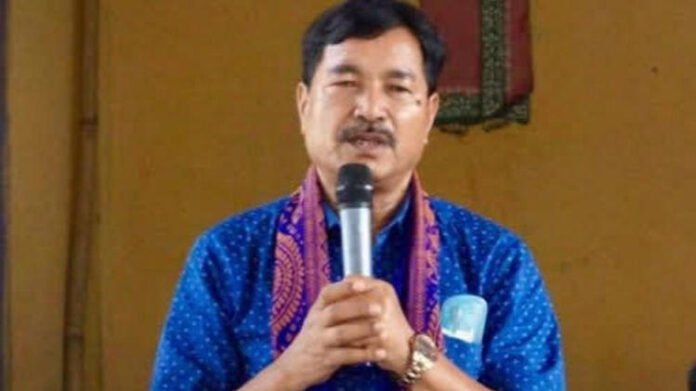Reo Reoa Narihary, a Member of the Bodoland Territorial Council (BTC) and an influential leader of the Bharatiya Janata Party (BJP), has announced his resignation from the party. Citing personal hardships as the reason behind his decision, Narihary’s departure has raised eyebrows in both political and public circles, drawing attention to the challenges faced by elected representatives within the BJP in Assam. The resignation of such a prominent figure signals potential shifts in the local political landscape and comes at a time when the state is gearing up for crucial elections.
Narihary, who was elected as a Member of the Council of Members of the Legislative Assembly (MCLA) for the Bodoland Territorial Region (BTR), stated that his decision to part ways with the BJP was a personal one, driven by ongoing struggles in his private life. While he did not delve deeply into specifics, his public explanation suggests that these difficulties had become too overwhelming to continue under the BJP’s political fold. His resignation has sparked a wave of speculation about his future political moves and whether he will align with a new political force in the region or take a break from active politics altogether.
The Rise of Reo Reoa Narihary
Reo Reoa Narihary has been a key figure in Assam’s political scene, particularly in the Bodoland Territorial Region, which has been a focal point of both political and socio-economic issues in recent years. As an MCLA from the BJP, Narihary played a crucial role in representing the interests of his constituents and addressing local concerns, especially those pertaining to the development and welfare of the Bodoland region.
His affiliation with the BJP marked a significant phase in his political career, as the party has been an influential player in the political landscape of Assam. With the rise of the BJP in the region, particularly after the signing of the Bodo Peace Accord, many leaders, including Narihary, were attracted to the party’s promises of development, peace, and political stability for the indigenous Bodo communities.
However, as Narihary’s resignation from the party indicates, the challenges and pressures of aligning with a major national party in a region as politically volatile as Assam seem to have taken a personal toll on him. The complexities of navigating party politics, coupled with personal issues, have led to this unexpected decision to sever ties with the BJP.
Political Significance of the Resignation
Narihary’s resignation from the BJP holds considerable significance, not only within the Bodoland Territorial Region but across the political landscape of Assam. His departure could have potential ramifications for the BJP’s influence in the region, which has been crucial to the party’s political strategies in the state.
The Bodoland region, which has a large Bodo-speaking population, has witnessed considerable unrest in the past, especially related to issues of autonomy, land rights, and cultural preservation. The BJP’s alliance with local Bodo groups, including the Bodo Liberation Tigers (BLT), helped it win substantial support in the region in recent years. However, the political environment in Assam has always been fluid, and the resignation of a prominent leader like Narihary could signal the beginning of a change in local dynamics.
While Narihary has cited personal reasons for his decision, political analysts are speculating that there may be underlying tensions within the party, which could have contributed to his decision. His exit may also reflect the challenges faced by regional leaders when aligning themselves with national political parties that have their own agendas and priorities, which may not always align with local aspirations.
Reactions from BJP and Political Rivals
The BJP, which has established a strong foothold in Assam, particularly after the signing of the Bodo Peace Accord, is yet to officially respond to Narihary’s resignation. However, party insiders have hinted that while the resignation is unfortunate, the party’s resolve to strengthen its base in the Bodoland region will remain unshaken. The party is likely to look for a replacement to maintain its influence in the region, especially as the state approaches key elections in the near future.
Meanwhile, opposition parties in Assam, including the Congress and All India United Democratic Front (AIUDF), have seized upon Narihary’s resignation as an opportunity to criticize the BJP’s handling of local issues. Both parties have pointed to the resignation as evidence of growing dissatisfaction among regional leaders with the BJP’s centralization of power and lack of attention to the unique needs of Assam’s ethnic communities.
For the Congress and AIUDF, Narihary’s resignation could serve as a rallying point for garnering support in the Bodoland region, where both parties have traditionally had a strong presence. The shifting political dynamics in the region could open up opportunities for opposition parties to capitalize on any disillusionment with the BJP.
The Road Ahead for Narihary
As for Reo Reoa Narihary, the future remains uncertain. While he has not made any clear statements regarding his next steps, there is speculation that he may join another regional political party or may even take a break from politics altogether to focus on his personal challenges. His long-standing influence in the Bodoland region ensures that his political career is far from over, regardless of which path he chooses.
His resignation, while primarily motivated by personal hardships, also highlights the growing discontent and challenges that regional leaders face when working under national parties with diverse interests. Narihary’s move could prompt other regional leaders in Assam to reassess their affiliations and consider new ways to balance local issues with broader political agendas.
In addition, Reo Reoa Narihary’s resignation from the BJP marks a pivotal moment in Assam’s political landscape. It underscores the complexities of regional politics, where personal and political struggles intersect, and the evolving dynamics between local leaders and national parties. As Assam looks ahead to its future political developments, Narihary’s decision is likely to reverberate across the state’s political scene, offering new insights into the challenges faced by leaders in navigating the delicate balance between personal well-being and public service.


